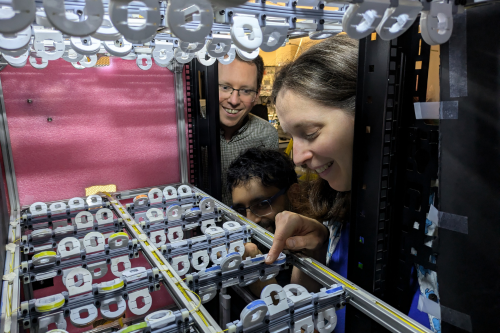University of Bristol to Take Leading Role in New Quantum Hubs Initiative
The University of Bristol is set to play a major role in a series of new hubs being launched to ensure the UK fully benefits from the potential of quantum technologies in areas ranging from healthcare to national security.
Applications include the transformation of early disease diagnosis, quantum cameras capable of detecting gas leaks, the creation of a ‘quantum internet’, and improved navigation and timing systems.
The University of Bristol will play a critical role in three of the five new hubs announced by the Government today, receiving more than £4.5m in total funding. In total, the five hubs will receive a £106 million investment from the Engineering and Physical Sciences Research Council (EPSRC), the UKRI Biotechnology and Biological Research Council, UKRI Medical Research Council, and the National Institute for Health and Care Research.
The hubs Bristol will be involved in are the Integrated Quantum Networks Research Hub (IQN), UK Quantum Technology Hub in Sensing, Imaging and Timing (QuSIT), and the UK Hub for Quantum Enabled Position, Navigation and Timing (QEPNT).
Professor Dimitra Simeonidou, the IQN’s Bristol lead and Director of the Smart Internet Lab, said “Today’s announcement will drive new technologies and solutions for future quantum networks. Bristol has a longstanding, global reputation in telecommunications networks and this award will ensure we stay at the forefront of the field and will influence the evolution towards the Quantum Internet”.
The IQN Hub brings together expertise from colleagues from across the University of Bristol, including the Smart Internet Lab, the Bristol Digital Futures Institute, and the Quantum Engineering Technology Labs.
Dr Rui Wang, Lecturer for Future Optical Networks in the School of Electrical, Electronic and Mechanical Engineering High Performance Network Research Group, will lead on the development of the future entanglement-based quantum networks including advancing the state-of-the-art in network resource scalability.
Dr Siddarth Joshi, Lecturer in Optical Communications, will lead work on strengthening the UK’s leadership in satellite quantum communication, leveraging significant current investments in the Quantum Communications, including the launch of the in-orbit demonstrator “SPOQC” and full operation of an Optical Ground Station later in 2024. He is also developing the next generation of entanglement based quantum networking technologies that will be interfaced to a variety of quantum devices.
Dr Alex Clark, Senior Lecturer and Royal Society University Research Fellow in the Quantum Engineering Technology Labs, will lead on enhancing quantum network capabilities through integration with quantum memories.
The IQN Hub, led by Heriot-Watt University, aims to create a ‘quantum internet’ formed of globally-interlinked quantum networks which can co-exist with classical telecommunications networks. It aims develop quantum networks at different scales, quantum-safe communications scaled in rate and distance, and entanglement-enabled distributed quantum computing.
The QuSIT Hub, led by the University of Birmingham, aims to overcome barriers to quantum sensing, imaging and timing, aiming to ‘see the invisible’ with applications in health such as quantum brain scanners to investigate dementia, and quantum cameras to detect gas leaks. Dr Alex Clark, will be leading a work package in the QuSIT Hub targeting infrared sensing and imaging of gases over long distances while only needing to detect visible light.
The QEPNT Hub, led by the University of Glasgow, will deliver quantum technologies to develop resilient position, navigation and timing systems for use in national security and critical national infrastructure.
Dr Carrie Weidner, Senior Lecturer from the School of Electrical, Electronic and Mechanical Engineering and School of Physics will lead a QEPNT project to make quantum-enhanced navigation systems more robust, decreasing their size and weight and increasing functionality. Meanwhile Dr Clark will work on covert range finding systems. The QEPNT Hub’s activities will combine for use outside the lab in real-world air, land and sea demonstrations.
Dr Weidner said: “Quantum-enhanced positioning, navigation, and timing is one of the most advanced applications of quantum technology, and Bristol is delighted to be a part of this hub and its efforts to develop this technology, bringing devices out of the lab and into the real world.”
Dr Alex Clark said: “ I am incredibly excited to be taking leading roles in this UK-wide collaboration. The team brings a huge array of skills from diverse backgrounds which will be key to creating novel technologies that will be translated into real-world applications.”
The new hubs continue the work of the UK National Quantum Technologies Programme. Now in its tenth year, the partnership of more than £1 billion between government, academia and industry, fast-tracks quantum knowledge from laboratory to wider society and economic impact.
They are a key component of the UK National Quantum Strategy, which outlines an investment of £2.5 billion of government funding in quantum R&D in the next ten years, and are closely aligned to the five National Quantum Strategy Missions, which outline where quantum technologies can bring significant benefits to the economy and society.

